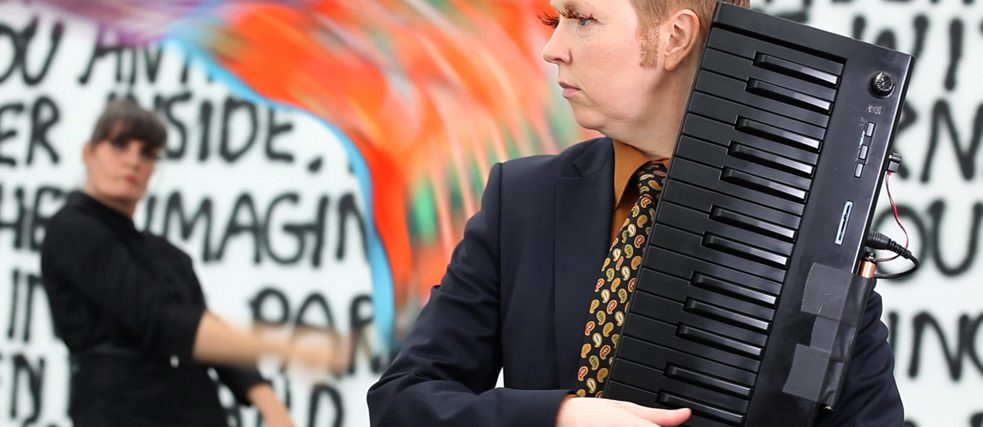A Portrait of Fender Schrade
“I've tried all sorts of identities”

As the other half of the artistic duo, NAF, the Stuttgart sound engineer, performer and musician, Fender Schrade, has been shaking the very foundations of the way people view gender. This is a conversation about what it is like to be a trans* in the music scene, and about why feminism is the root of everything.
Fender Schrade has the rare ability to speak in whole, logical sentences, without any filler words and mental leaps. He thinks before he speaks, and while he is thinking, he ruffles his sandy coloured hair. His voice sounds different than in his previous videos. This is due to the testosterone that Fender has been taking for about a year. Fender, born in 1972, has been using the male pronoun for quite some time now. “I was born with female sexual characteristics,” explains the 45-year-old artist. “And up to my coming out as a trans* almost fifteen years ago, I had always been read as a woman in public. At that time, however, I had already started reacting to this by using the “he” pronoun, because this helped me deal better with the non-binary state I felt I was in, i.e. the fact that I could not and did not want to be either a woman or a man.
“I had already been a woman, I had already been a lesbian, I had already been a tomboy”
The more the awareness of trans* grew in Germany, the more opportunities came to the fore. The gender-neutral double pronoun “er_sie” (he_she) and trans* with an asterisk and underscored, are attempts to make non-binary people visible. A real challenge for the German language, where everything is assigned a gender. Fender also tried for a long time to adopt one of these options. “Like many other trans* people, I tried all sorts of identities,” he laughs. “I had already been a woman, I had already been a lesbian, I had already been a tomboy ..., but the question of ‘testosterone’ bothered me all the time - both in my body and in my head.” And because he was tired of having to deal linguistically with subjunctives all the time, he decided to go for the hormones. And for the “he”. The trans* theme permeates both his life and his work. “The more exciting point is, however, – that the theme has not just remained part of my own private domain, but has branched out into a larger social context.”“I was too strongly defined by my body”
Fender Schrade’s artistic work is complex and always has something to do with music. He was three when he discovered his love for sound – he was taking children’s music classes. Fender, whose childhood was that of a “classic transsexual”, including parents who could not cope, fell in love with an e-piano, one that was small enough for children's fingers. He played by colours, not by notes, and at the age of three or five he had learned everything he needed musically. “I'm still drawing on it today,” he says. Fender bought his first synthesizer at the age of twelve from an American GI. “I can still remember how I had to hump it home, it was very heavy and I was somewhat petite.” It was the time of MTV, the advent of electronic music. This analogue synthesizer was what Fenders first band kicked off with, when he was fourteen. When he left school, however, the clouds of the gender issue started to loom on the horizon. Studying music at the time in the binary music business was not on the agenda at all – more so back then than today. Even performing on stage became more and more difficult. “On the stage I was defining myself too strongly through my body – a body, in which I was not comfortable. And for that discomfort there was no word, there were no role models.” So Fender became a sound engineer – a self-taught one. “I went to a school for a while, where I was the only woman. It was just so sexist there that I left it and trained myself.” At the age of 27, he decided once again to try a course of study to become an audiovisual engineer, and it was around that time that Fender also discovered something that described what he had felt since his childhood – Monika Treut's film Gendernauts was a revelation for him.In this film he also found his first role model – Sandy Stone, a transsexual music producer. From a feminist point of view, Fender also had a key experience when he read an ad in a Stuttgart newspaper: “Frauenband sucht Mischerin” (Wanted – A female sound mixer for a women’s band). Fender called. He and his mixing console quickly became a fully fledged member of the band and Fender soon began to see the artistic potential of his instrument. In the meantime, Fender has filled more than 2,000 concerts with sound. Between 2009 and 2014, Fender was part of the successful pop duo, VOW, together with Linda Wölfel (former Rhythm King and Her Friends), he has written film music and on theatre performances he has delved into the joys of working with light. “It’s all somehow related, there are waves, just like music,” he says, grinning. He also gives lectures on trans* people in the music scene and on trans* role models.
“On the stage it’s all about me being trans*”
In addition to trans* issues, feminism is one of the fundamental pillars Fender bases his work on – especially in the NAF project, which he has almost exclusively devoted himself to since 2015. NAF is a cooperation with the visual artist, Nana Hülsewig, who started her career in 2013 as part of a joint scholarship from the Stuttgarter Künstlerhaus (Stuttgart Artists Foundation). “Of course, I also work very autobiographically in the NAF project; on the stage it’s all about me being trans*. And with Nana it’s all about her being a woman. Thus, two themes that are found in feminism can be depicted side by side.” The way the diversity of people and their bodies is perceived is one of Fender’s main concerns. “These differences are very important! Whether in my private life or in my artistic work. It's simply about enduring the positions of others, in order to be able to live together.” That is why NAF cooperates with other artists, both male and female: in the first part of their project, NORM IST F!KTION , for example, at performances in public spaces, in the second part in the form of a stage play. They are currently working on NORM IST F!CTION #3, a film whose production has the duo working non-stop round the clock. Yet if there is an unexpected free moment, Fender uses it for the project that is most dear to his heart – his instrument.“All the sounds I need are in these keys.”
He began developing his keyboard when he was working on the VOW project. “I always wanted to build an instrument myself,” he says, “and then explore how my body reacts towards the instrument and how they mutually inspire each other.” He plays it like a guitar, like a drum, uses it to speak with, “All the sounds I need are in these keys.” All his sounds and the archive of his life. Fender's voice before and after the testosterone, samples from trans* persons, documented encounters. “People are immediately put into categories because of their voice – gender, status, origin, education, the whole gamut. On the stage, not talking with my mouth, but with my machine, was an attempt to detach my voice from my body. And now I can even mix my current voice with my old one. This creates absurd situations on the stage, because it is the same person, but he is being read and perceived differently by the people on the outside.” At present, his completely black keyboard is six meters long and supported by a specially crafted XXY stand. “That speaks for itself,” says Fender.Fender Schrade
is a musician, performer and media engineer and lives in Stuttgart. He studied audiovisual media in Stuttgart and has been part of the artistic duo NAF since 2013. NAF work in the fields of performance, music, theatre, video and fine arts. His work deals with the limits of cultural norms and media technologies from a trans* feminist perspective.

Comments
Comment